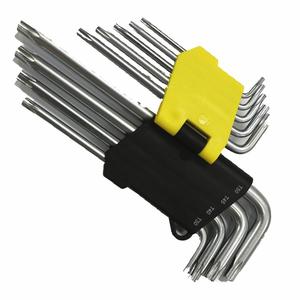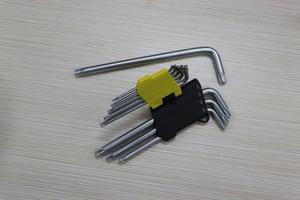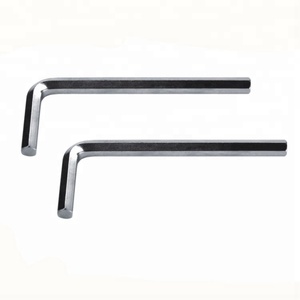(40 products available)

















































































































































 Ready to Ship
Ready to Ship









































different types of allen keys are indispensable tools in various industries, known for their precise engineering and versatile applications. These tools are designed to tighten or loosen hexagonal bolts and screws, providing an efficient solution for assembly and maintenance tasks. Made from high-grade materials, different types of allen keys offer durability and precision, ensuring a reliable performance even in demanding environments. Their compact design allows for easy handling and storage, making them a popular choice among professionals and DIY enthusiasts alike. As industries evolve, different types of allen keys continue to adapt, offering innovative features that enhance usability and effectiveness.
different types of allen keys come in various types, catering to diverse needs and applications. The most common types include L-shaped hex keys, T-handle hex keys, and folding hex key sets. L-shaped hex keys are the traditional choice, offering simplicity and ease of use for straightforward tasks. T-handle hex keys provide additional leverage and comfort, making them ideal for tasks requiring more force. Folding hex key sets offer portability and convenience, with multiple sizes integrated into a single compact tool. Each type of different types of allen keys is designed to meet specific requirements, allowing users to select the most suitable option based on the task at hand.
different types of allen keys are designed to perform a variety of functions with precision and efficiency. They are primarily used to adjust hexagonal fasteners, ensuring secure assembly and disassembly. Key features include ergonomic handles for comfortable grip, durable materials for long-lasting use, and compact sizes for easy access in tight spaces. Some different types of allen keys also feature ball-end designs, allowing for angled entry to fasteners, which is particularly useful in challenging locations. The precision engineering of these tools ensures that they fit snugly into fasteners, minimizing the risk of stripping and damage. Additionally, color-coded sets help users quickly identify the correct size, enhancing productivity and reducing downtime.
The construction of different types of allen keys involves the use of high-quality materials to ensure durability and performance. Typically made from chrome-vanadium steel, these tools offer exceptional strength and resistance to wear and corrosion. Some variants are coated with black oxide for additional protection and a sleek appearance. The choice of material impacts the tool's longevity and effectiveness, making it crucial for users to select different types of allen keys that match their application needs. As technology advances, manufacturers are exploring innovative materials and coatings to enhance the performance and lifespan of these essential tools.
To use different types of allen keys effectively, it's important to select the appropriate size for the fastener to avoid damage and ensure a secure fit. Insert the tool into the fastener and apply consistent pressure, turning it clockwise to tighten and counterclockwise to loosen. Ensure that the tool is perpendicular to the fastener to avoid stripping. For tasks requiring additional torque, consider using T-handle or ball-end variants of different types of allen keys. Regular maintenance, such as cleaning and lubricating, will prolong the tool's life and performance. Proper storage in a dry environment will also protect different types of allen keys from rust and degradation, ensuring they remain reliable for future use.
Choosing the appropriate different types of allen keys requires a thorough understanding of your specific needs and the tasks at hand. One crucial factor to consider is the size of the hex key, as using the wrong size can lead to damage or inefficiency. It's essential to have a comprehensive set of different types of allen keys to accommodate different fasteners, ensuring versatility and adaptability. Additionally, the handle design should be evaluated, with options such as ergonomic grips or T-handles offering enhanced comfort and control during use. Material selection also plays a critical role, with chrome-vanadium steel being a popular choice for its durability and resistance to wear.
Another important consideration is the finish of the different types of allen keys. Some hex keys feature a black oxide coating, which provides an additional layer of protection against corrosion and wear. This coating can extend the lifespan of the tool, making it a wise investment for frequent users. The compactness of the tool should also be taken into account, especially for professionals who need to carry their tools on-the-go. Folding sets of different types of allen keys offer a practical solution, combining multiple sizes into a single compact unit that is easy to transport and store.
Metric and imperial different types of allen keys differ in their sizing systems. Metric hex keys are measured in millimeters, while imperial hex keys are measured in inches. Choosing between the two depends on the specifications of the fasteners you are working with. It's important to have both types available if you frequently encounter fasteners from different regions or manufacturers to ensure compatibility and avoid damage.
To prevent stripping, ensure that the different types of allen keys fits snugly into the fastener head. Applying consistent pressure and maintaining the tool perpendicular to the fastener will minimize the risk of damage. Using a ball-end hex key can provide flexibility for angled entry, but caution should be taken to avoid excessive force. Regular inspection and replacement of worn or damaged hex keys are also vital to maintaining effective performance.
Ball-end different types of allen keys offer the advantage of angled entry, allowing access to fasteners in tight or obstructed spaces. However, they may not provide as much torque as standard hex keys. The choice between ball-end and standard hex keys depends on the specific requirements of your tasks. For high-torque applications, standard hex keys are preferable, while ball-end keys are suitable for situations requiring flexibility.
While different types of allen keys are primarily designed for hexagonal fasteners, they are not suitable for all types of fasteners. Fasteners with different head designs, such as Phillips or flathead, require specific tools. It's important to use the appropriate tool for each fastener type to ensure efficient operation and prevent damage. Having a diverse toolkit that includes various types of keys and drivers can enhance versatility.
Maintaining different types of allen keys involves regular cleaning to remove debris and lubricating to prevent rust and wear. It's also important to store hex keys in a dry environment to protect them from moisture and corrosion. Inspecting the tools periodically for signs of wear or damage and replacing them when necessary will ensure reliable performance. Proper maintenance extends the lifespan of hex keys and maintains their effectiveness for future use.